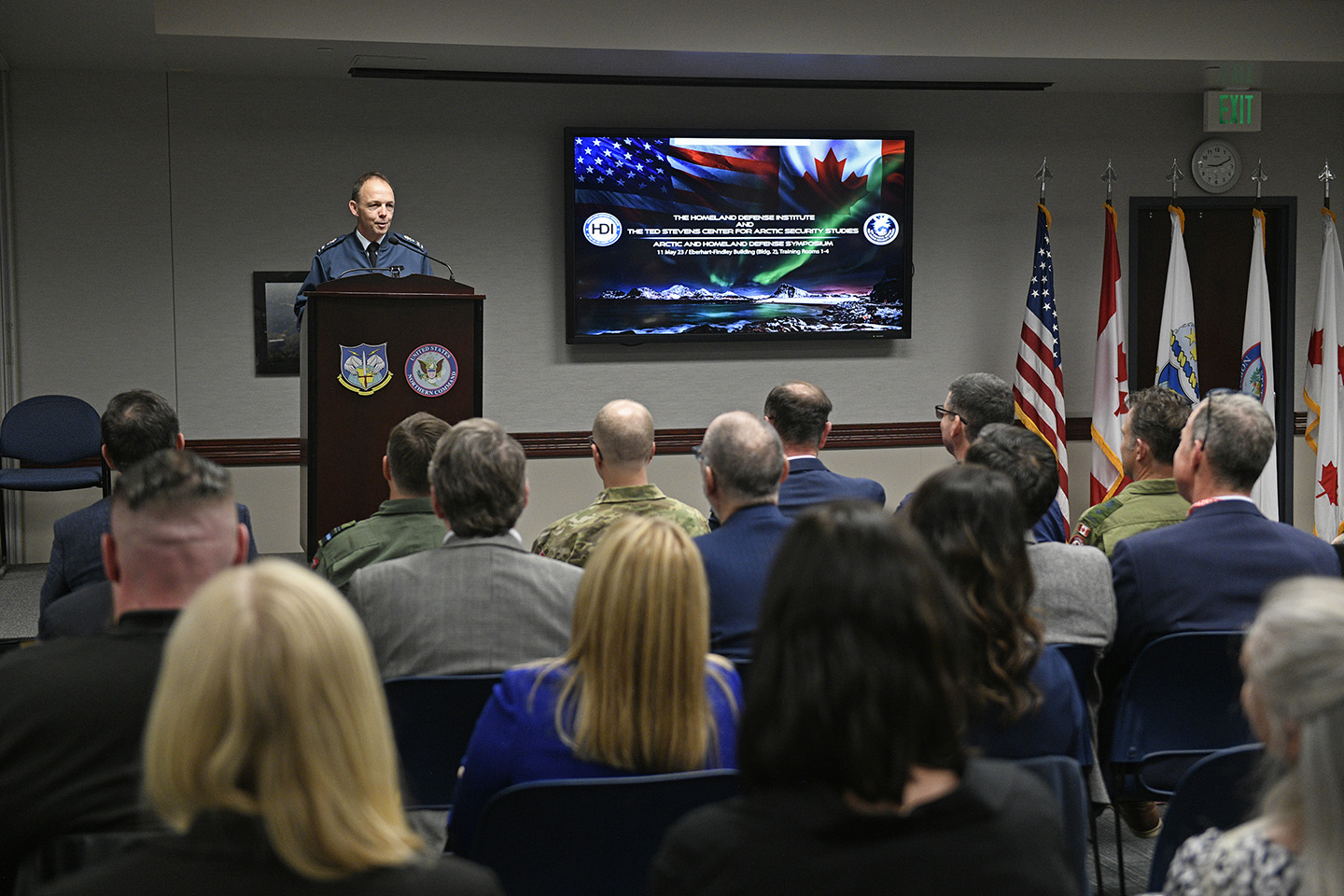Assistant Secretary of Defense Melissa G. Dalton delivers the keynote address. THE WATCH STAFF
Arctic partners convened at the headquarters of the North American Aerospace Defense Command (NORAD) and U.S. Northern Command (USNORTHCOM) in May 2023 to exchange views on the Arctic’s key role in homeland defense.
The Homeland Defense Institute and the Ted Stevens Center for Arctic Security Studies hosted the Arctic and Homeland Defense Symposium on May 11, 2023. The event was in conjunction with NORAD’s 65th anniversary celebration on May 12, 2023. The symposium provided a forum where senior military leaders, government officials and academic experts discussed key issues related to the future of NORAD and homeland defense in the Arctic with 120 attendees from Canada, Denmark, the United Kingdom and the United States.
Both Canada and the U.S. have placed a renewed focus on the circumpolar Arctic region and potential threats. More than 50% of NORAD’s area of operations is in the Arctic. Speakers at the symposium emphasized the threats from Russia’s Arctic militarization and the growing interest in the region by the People’s Republic of China (PRC). The PRC is emphasizing scientific diplomacy, infrastructure projects and research facilities while providing funding for the development of Russia’s oil and gas sector in the Arctic.
Canada and U.S. speakers emphasized the need for a new and resilient infrastructure as the climate warms to overcome the challenges of melting ice and thawing permafrost. “This trend has defense implications for North America,” one speaker said. “Increasing access to the Arctic due to warming conditions will likely result in more frequent economic and military competition from the PRC and Russia.”

To address the rapidly expanding ambitions of Russia and the PRC in the Arctic, the U.S. and Canadian governments have pledged increased funding for NORAD modernization, expanded international partnerships with key Arctic allies in NATO such as Norway, Denmark, the U.K. and Iceland, and have placed renewed emphasis on the rules-based international order. “The sharing of activities amongst our allies and partners will help enhance our presence and collective monitoring, pooling of resources including icebreakers, expanding scientific research, protecting precious resources, and establishing strong governance structures,” another speaker said.
Canada announced a $70 billion investment in NORAD modernization efforts in 2022. Along with Canadian investments in NORAD modernization, the U.S. Congress has also advocated to speed up the NORAD modernization process by providing advanced capabilities to NORAD. These modernization efforts will include six new Over-The-Horizon Radar systems, including four in the U.S. and two in Canada. Symposium speakers also discussed a new space-based system to track hypersonic weapons from Russia and China. The new system was touted as ground-breaking technology that will provide unmatched domain awareness and allow decision makers increased decision-making time.

All the panelists underscored that the actions taken in the region by Russia and the PRC — whether military, commercial or political — have global implications.
“The Arctic, which has evolved from a cold, dark, remote, isolated and disconnected region,” a speaker said, “is now a new, interconnected, increasingly consequential and globalized region, which will become one of the 21st century’s most contentious areas.”
Panelists reaffirmed the need to approach the Arctic through a whole-of-nation approach. To outpace Russia and the PRC in the Arctic, it will take public and private investments in new technologies and infrastructure to counter the threats posed. One panelist also pointed out the need to better incorporate Indigenous populations into this approach as they have deep knowledge of the land and how to operate in harsh Arctic environments. A whole-of-nation approach to Arctic issues will allow the U.S. and Canada to leverage new technologies and faster development times to give NORAD increased capabilities.


Comments are closed.